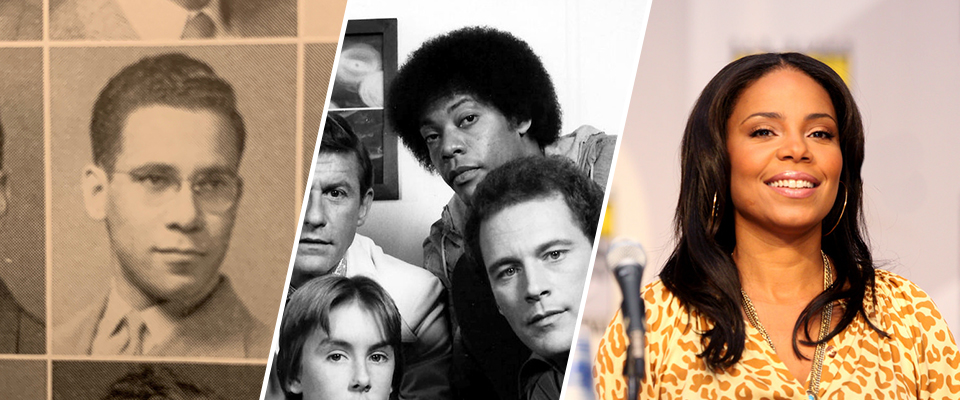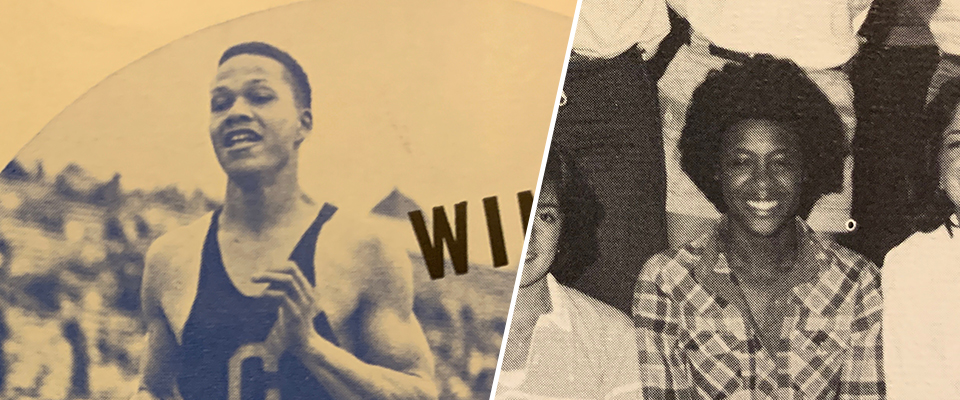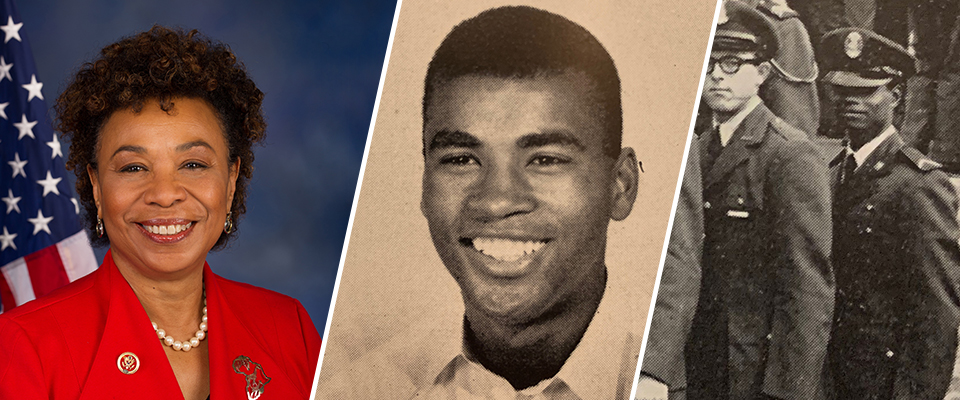For Black History Month, we will be highlighting a series of Black Cal alumni trailblazers who have made significant accomplishments in their fields. These individuals were selected for the notable impact they have made in their communities, professions, and in the world. Although there are many more notable Black Cal alumni in the arts, here is a glimpse at just a few individuals who have made a significant impact.
See a timeline of Pioneering Black Alumni in UC Berkeley History.
Robert Colescott ’49, M.A. ’51

Before coming to UC Berkeley in 1947, Colescott volunteered to enlist in the US Army, where he stayed for four years before returning to the Bay Area and attending San Francisco State University. At San Francisco State, Colescott was not considering art as a profession and thought of it more as a hobby. Colescott once said of choosing his major, “I was studying international relations, political science, economics…[the counselor] advised me to reconsider because he didn’t think that there would be a career for me as an African American person.”1 This conversation led Colescott to change his major to art when he transferred to Cal in 1947.
After earning his baccalaureate degree, Colescott spent a year in Paris studying with Cubist artist Fernand Léger, who significantly influenced Colescott’s style. “[Léger] directed me,” Colescott said. “He didn’t think that abstract work had enough meaning and enough significance for his people. And so he encouraged me to go back to the figure and give up abstraction as such.”2
Upon returning to the United States, Colescott finished his Masters of Arts degree with a major in art practice at UC Berkeley in 1951. Many of Colescott’s works sparked a nerve in audiences, such as his famous painting George Washington Carver Crossing the Delaware: Page from an American History Textbook (1975), in which Colescott reimagined Emanuel Leutze’s heroic scene with black stereotypes. Colescott insisted that he meant to satirize white perceptions of black people, and even said, “It’s about white perceptions of Black people. And they may not be pretty. And they may be stupid. We didn’t make up these images. So why should we take the heat? But it’s . . . it’s satire. It’s the satire that kills the serpent, you know.”3
Colescott went on to teach art in the northwestern US and took a teaching residency in Cairo, Egypt, in 1964.4 After nearly five decades of work, in 1997 Colescott was chosen to represent the United States at the Venice Biennale, becoming the first African American to earn a solo exhibit.
Jay Wright ’61, M.A. ’67

After serving in the US Army from 1954 to 1957, Wright came to UC Berkeley under the G.I. Bill and studied comparative literature.5 He went on to get his master’s of arts in comparative literature from Rutgers University and, shortly after, began touring Black southern schools for Woodrow Wilson’s National Endowment for the Arts program, promoting equal access to the arts in communities across the United States.6
Before his first book of poems, The Homecoming Singer (1971), was published, Wright’s poems were included in anthologies such as New Negro Poets: U.S.A. (1964), edited by Langston Hughes, and For Malcolm: Poems on the Life and Death of Malcolm X (1967), edited by Dudley Randall and Margaret Burroughs.7
As both a poet and playwright, Wright was selected for the Hodder Fellowship at Princeton University, in which selected fellows are “writers or other kinds of artists or humanists who have ‘much more than ordinary intellectual and literary gifts.’”8 Over the years Wright published fourteen volumes of poetry to high acclaim and won several awards, including the 2000 Lannan Literary Award for Poetry, a Guggenheim Fellowship, and a Macarthur Fellowship. In 2005, he became the first Black recipient of the Bollingen Prize in Poetry.9
Carl Franklin ’71, M.F.A.

After graduating from UC Berkeley in 1971 with a degree in dramatic arts, Franklin tried his hand at acting for a few years, landing small roles on television. He decided to further his education at the American Film Institute where he received his M.F.A. in directing in 1986. On changing his career from acting to directing, Franklin said, “The problem with being a black actor in Hollywood, especially at that time, was that we didn’t have careers, we had jobs. I was one of those few people who actually made a living, but there was no security because you really couldn’t create a market for yourself…I started writing to create roles for myself, then went to the American Film Institute to learn how to direct, because I wanted to have a little more control over my life.”10
In 1992, Franklin got his first big break in directing with the film One False Move, for which he earned the New Generation Award from the Los Angeles Film Critics Association, the MTV Movie Award for Best New Filmmaker, and the IFP Spirit Award for Best Director.11 In 1995, he once again received rave reviews from critics for his direction of Devil in a Blue Dress, which starred Denzel Washington. Two years later, in 1997, he directed the film One True Thing, which starred Renée Zellweger, William Hurt, and Meryl Streep, who earned Oscar and Golden Globe nominations for her role in the film. More recently, in 2014, Franklin was nominated for an Emmy Award for Outstanding Directing for a Drama Series for House of Cards (Episode: “Chapter 14”).
Terry McMillan ’77

McMillan’s love of language stemmed from her first job at age sixteen: shelving books in a local library, a job she took to help her mother make ends meet.12 The following year, she left her home in Michigan to move to Los Angeles, where she found work as a secretary and took classes in African American literature at Los Angeles City College.
The more she read, particularly of the works of African American authors such as Ann Petry, the more she felt a calling to write. She decided to pursue a bachelor’s degree in journalism from UC Berkeley, and graduated in 1977. In 1992, McMillan achieved national attention for her third novel, Waiting to Exhale, which maintained its place on The New York Times Best Sellers list for several months and went on to sell more than three million copies by 1995. The novel’s popularity led to a film adaptation directed by Forest Whitaker, starring Whitney Houston, Angela Bassett, Loretta Devine, and Lela Rochon.
Four years after Waiting to Exhale, McMillan published her fourth novel, How Stella Got Her Groove Back, which was also adapted into a film starring Angela Bassett and Taye Diggs.13
In subsequent years, McMillan’s novels would be turned into films including Disappearing Acts, which starred Wesley Snipes and Cal alumna Sanaa Lathan ’62, M.F.A., and A Day Late and a Dollar Short, which starred Whoopi Goldberg.
Sanaa Lathan ’92, M.F.A.

Although she majored in English at UC Berkeley, Lathan cultivated her craft of acting during her undergraduate years by performing with the Black Theatre Workshop.14 After graduating from UC Berkeley in 1992, Lathan earned her M.F.A. from the Yale School of Drama.
It could be said that Lathan’s childhood set the stage for her future success in acting, as her parents were both involved in the entertainment industry. After graduating from Yale, Lathan landed roles on television shows such as Family Matters, NYPD Blue, and Moesha.15
Lathan’s acting has been recognized by the NAACP on multiple occasions: She won NAACP Image Awards in the category Outstanding Actress in a Motion Picture for her role in Love & Basketball and fifteen years later for The Perfect Guy, with many nominations in between. In 2004, Lathan was nominated for a Tony Award in the category “Best Performance by a Featured Actress” for her performance in A Raisin in the Sun.16
She has won many other awards, including BET’s “Best Actress” for her role in Love & Basketball, “Best Performance by an Actress” at the American Black Film Festival for her performance in Out of Time, and “Best Female Images in a Movie” at the Women Film Critic Circle Awards for her role in Something New.
In 2015, she founded the Sanaa Lathan Foundation to support underserved youth, particularly young women, who are aging out of foster care and seeking to gain access to higher education.17
Golden Brooks ’94, M.A.

While at UC Berkeley, Brooks got some of her first acting experience in the university’s productions of For Colored Girls Who Have Considered Suicide / When the Rainbow Is Enuf, The Brute, and Romeo and Juliet.18 In 1994, Brooks graduated from Cal with a bachelor’s degree in media representation with a minor in theater. She later moved to New York to attend Sarah Lawrence College where she earned her master’s degree in creative writing.19
Brooks moved back to California and landed a couple of small roles on television, but got her big break when she landed a role on Girlfriends. Her performance earned her a BET Comedy Award for “Outstanding Supporting Actress in a Comedy Series,” a Multicultural Prism Award for “Best Actress in a Comedy,” and a nomination for a NAACP Image Award in the category “Outstanding Actress in a Comedy Series.”20 Brooks is also known for her big-screen performances in Motives, Beauty Shop, and The Darkest Minds.
by Kiley Treacy




















